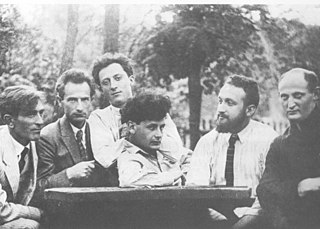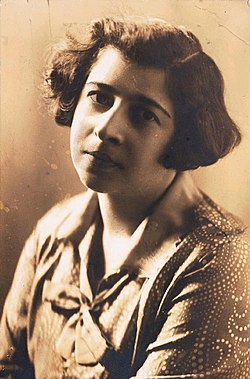
Abraham Sutzkever was an acclaimed Yiddish poet. The New York Times wrote that Sutzkever was "the greatest poet of the Holocaust."

Abraham Moses Klein was a Canadian poet, journalist, novelist, short story writer and lawyer. He has been called "one of Canada's greatest poets and a leading figure in Jewish-Canadian culture."

Rachel Bluwstein Sela was a Hebrew-language poet who immigrated to Palestine, then part of the Ottoman Empire, in 1909. She is known by her first name, Rachel, or as Rachel the Poetess. She is featured on Israel's 20 Shekel Banknote.
Seymour Mayne is a Canadian author, editor, translator of more than seventy books and monographs, and creative writing professor at the University of Ottawa. As he has written about the Jewish Canadian poets, his work is recognizable by its emphasis on the human dimension, the translation of the experience of the immigrant and the outsider, the finding of joy in the face of adversity, and the linking with tradition and a strong concern with history in its widest sense.

David G. Roskies is an internationally recognized Canadian literary scholar, cultural historian and author in the field of Yiddish literature and the culture of Eastern European Jewry. He is the Sol and Evelyn Henkind Chair in Yiddish Literature and Culture and Professor of Jewish Literature at the Jewish Theological Seminary of America.
The Jewish Public Library or JPL is a public library in Montreal, Quebec, Canada, founded in 1914. The library contains the largest circulating collection of Judaica in North America. The JPL has close to 4000 members, and receives 700 to 800 visitors weekly. A constituent agency of Federation CJA, the Jewish Public Library is independent of the Montreal Public Libraries Network and instead receives its funding from the city's Jewish community, membership fees, donations and endowments.

Chava Rosenfarb was a Holocaust survivor and Jewish-Canadian author of Yiddish poetry and novels, a major contributor to post-World War II Yiddish Literature.

Rachel Holzer was an internationally acclaimed Australian Jewish theatre actress and director.

Irena Klepfisz is a Jewish lesbian author, academic and activist.
Rajzel Żychlińsky was a Polish-born writer of poetry in Yiddish. She published seven collections over six decades. Her first two collections were published in Warsaw, Poland in 1936 and 1939, just prior to World War II. She survived the war by fleeing eastward to the Soviet Union, but many members of her immediate family were murdered in the Holocaust. Her postwar poetry, mostly written in the United States, was strongly influenced by these events.
The Helen and Stan Vine Canadian Jewish Book Awards were a Canadian program of literary awards, managed, produced and presented annually by the Koffler Centre of the Arts to works judged to be the year's best works of literature by Jewish Canadian writers or on Jewish cultural and historical topics.

Esther Raab was a Hebrew author of prose and poetry, known as "the first Sabra poet", due to her eminence as the first Israeli woman poet and for the prominence of her native landscape in her imagery.

Ida Maze, also known as Ida Maza and Ida Massey, was a Canadian Yiddish-language poet. Her home in Montreal became a literary salon and she became a maternal figure to Canadian Yiddish language authors.

J. I. Segal, born Yaakov Yitzchak Skolar, was a Canadian Yiddish poet and journalist. He was a pioneer in the creation of Canadian Yiddish literary journals, and was the foremost proponent of literary modernism in Yiddish Canada. His lyric poetry combines religious and folk tradition, modernist American literary practice, and Canadian landscape and atmosphere.

Zechariah Choneh Bergner, better known by his pen name Melech Ravitch, was a Yiddish poet and essayist. Ravitch was one of the world's leading Yiddish literary figures both before and after the Holocaust. His poetry and essays appeared in the international Yiddish press and in anthologies, as well as in translation.
Yehudis (Yudis) Tsik (1898–1988), better known by her pen name Yudika, was a Canadian Yiddish poet whose work was published around the world.
The Itzik Manger Prize for outstanding contributions to Yiddish literature was established in 1968, shortly before Itzik Manger's death in 1969. Manger "was and remains one of the best-known twentieth-century Yiddish poets." The Prize has been described as the "most prestigious in Yiddish letters". Apparently no Manger Prizes have been awarded after 1999.
Kathryn Ann Hellerstein is an American academic and scholar of Yiddish-language poetry, translation, and Jewish American literature. Specializing in Yiddish, she is currently a professor of Germanic Languages and Literatures and the Ruth Meltzer Director of the Jewish Studies Program at the University of Pennsylvania. She is known for her research focus on Yiddish women writers, notably Kadya Molodowsky, Malka Heifetz Tussman, and Celia Dropkin.
Rukhl Fishman, also spelled Rokhl Fishman was an Israeli poet who wrote in Yiddish. In 1978, she received the Itzik Manger Prize.











